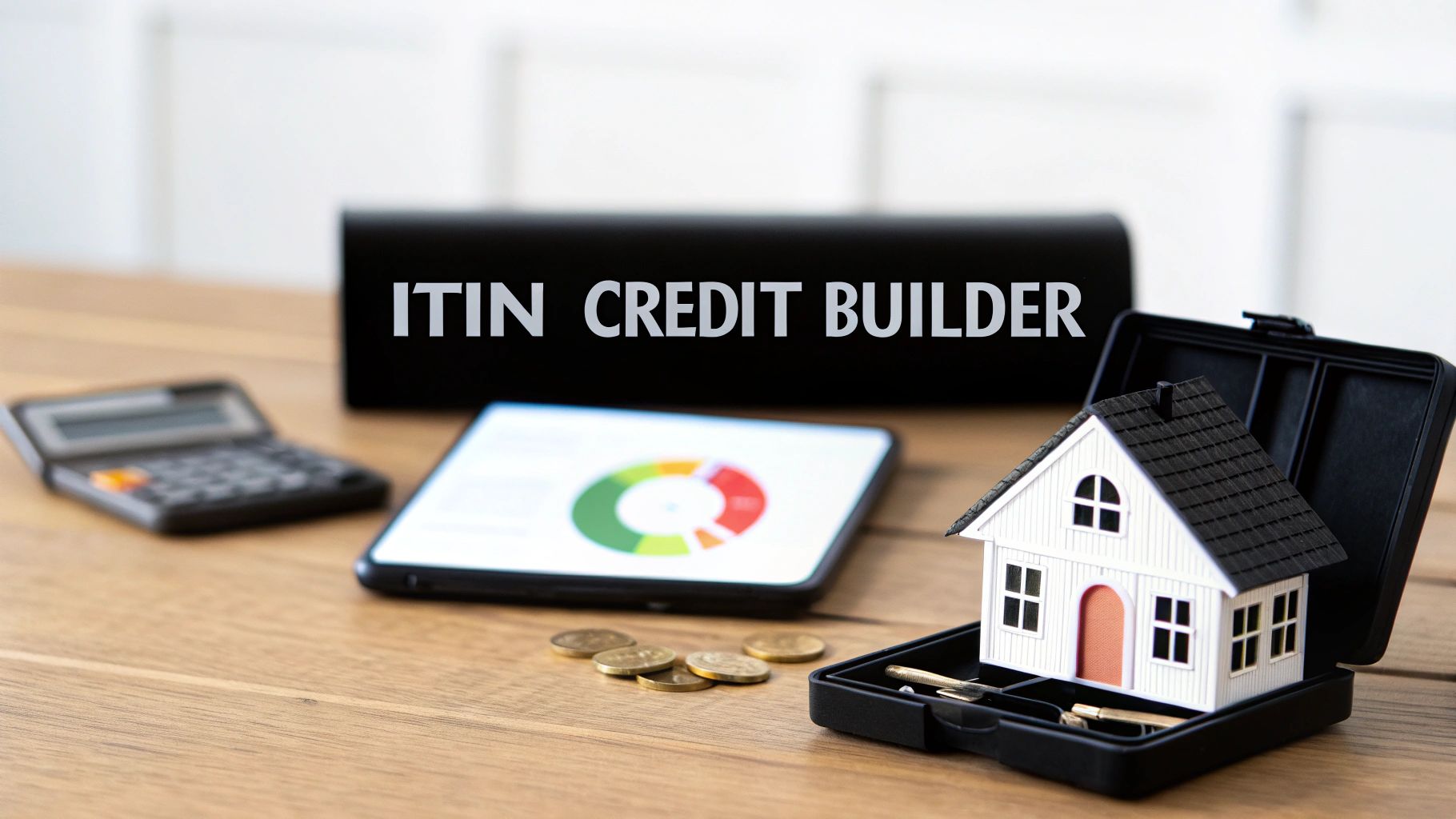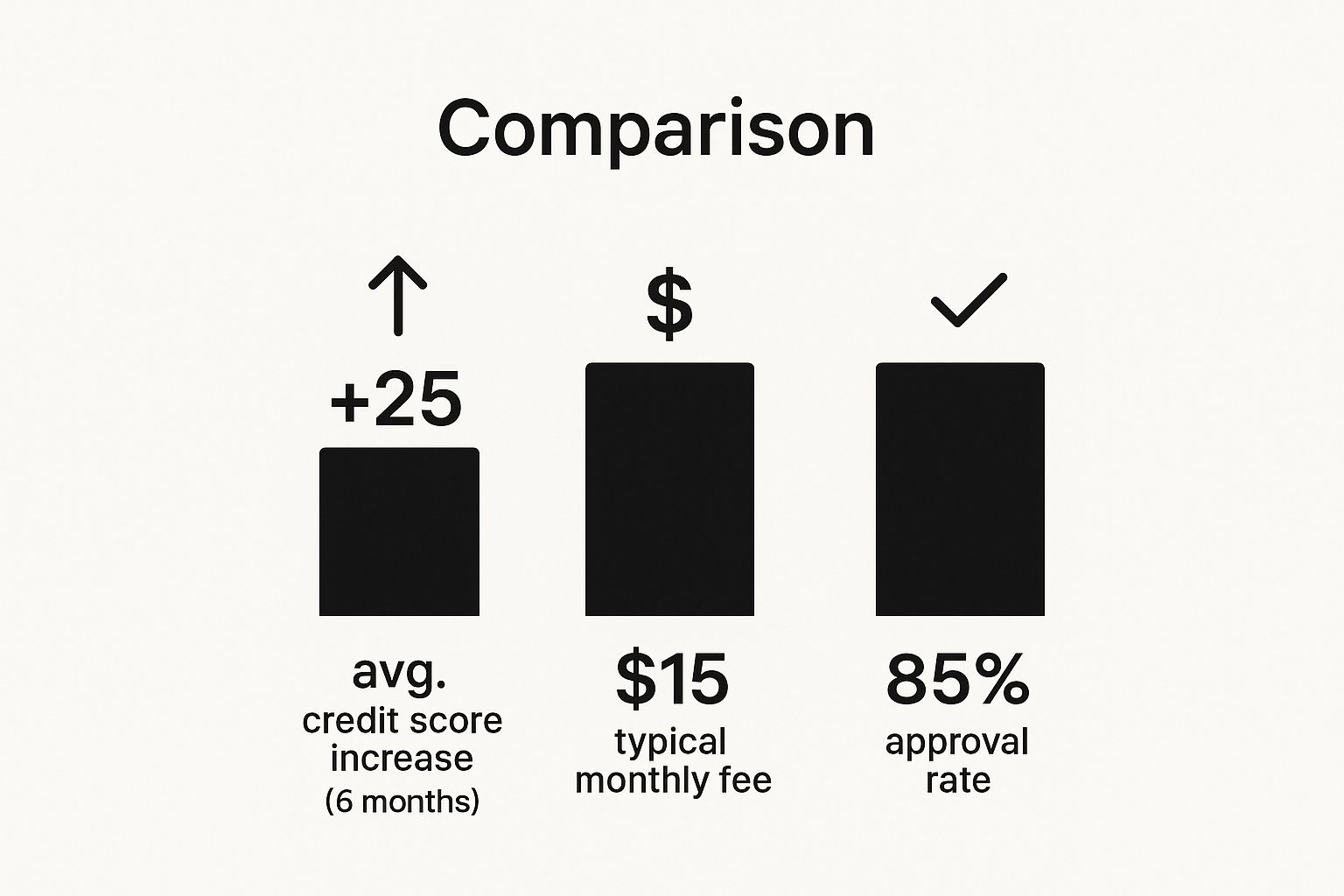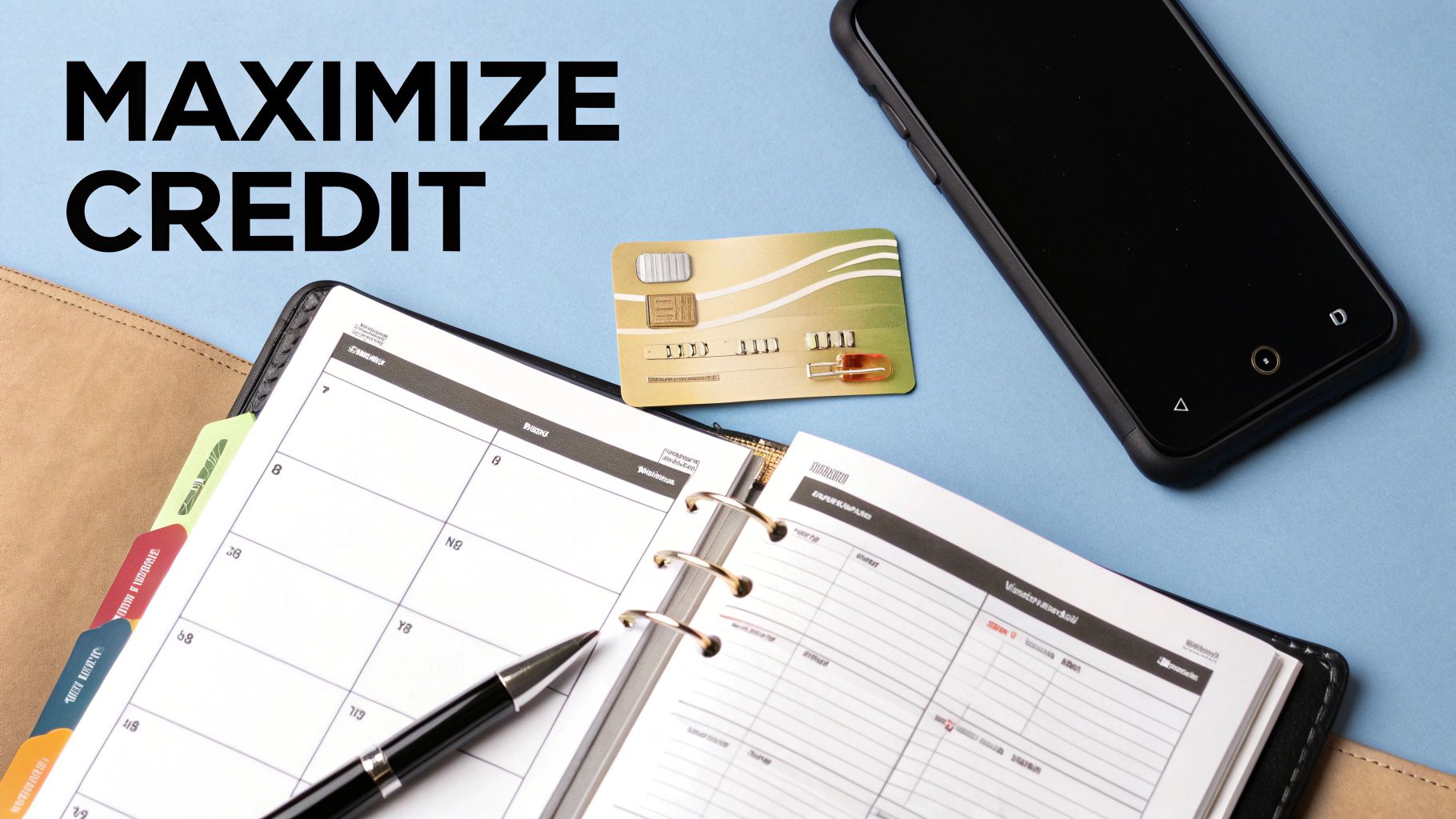Your Guide to ITIN Credit Builder Products

Credit builder products are a unique kind of financial tool. They're built from the ground up to help people establish or improve their credit history. Unlike a regular loan or credit card, the whole point is to create a track record of on-time payments that gets reported to the major credit bureaus. For anyone starting from scratch, they're one of the best first steps you can take.
How Credit Builder Products Lay Your Financial Foundation

Think about trying to build a house without a hammer or saw. For many ITIN holders just getting started in the U.S. financial system, building credit feels a lot like that—you know what you need to do, but you don't have the right tools. Credit builder products are that essential toolkit.
These aren't your everyday financial products. They're designed with a single, focused goal: to help you build a positive payment history. Your credit history is basically your financial resume. If you have no work experience, it's tough to get a job. In the same way, if you have no credit history, it's nearly impossible to get a loan, rent an apartment, or even get a cell phone plan without a huge deposit.
The Role of Credit Bureaus
So, what's the secret sauce? It all comes down to reporting. Every single on-time payment you make with a credit builder product gets reported to the major credit bureaus. This adds a positive mark to your financial resume, showing future lenders that you're a responsible borrower.
To really get why this matters, you need to understand the world these products live in. It's worth taking a moment to learn how all three credit bureaus work. These companies—Experian, Equifax, and TransUnion—are the record-keepers of your financial life.
A credit builder product makes sure your good financial habits don't go unnoticed. When a lender pulls your credit report, they'll see a history of consistent, on-time payments, which is a huge green flag.
Building Your Financial Resume
The main job of these tools is to solve the classic "you need credit to get credit" problem. They give you a way in. The benefits are straightforward but powerful:
For anyone looking to open doors to financial opportunities in the U.S.—especially ITIN holders—these products are often the smartest place to start. They take the mystery out of building credit and give you the power to write your own financial story.
What Are the Different Types of Credit Builder Products?
Trying to figure out credit builder products can feel like learning a whole new language. You've got credit builder loans, secured cards, reporting services… each one works a little differently. Getting a handle on these differences is the first step to picking the right one for your financial journey.
Think of it like choosing the right tool for a job. You wouldn't use a sledgehammer to hang a picture frame. In the same way, the best product for someone who wants to save money while building credit is probably different from the best option for someone who needs a card for small, everyday purchases.
Credit Builder Loans: The "Save-First" Approach
The credit builder loan is one of the most common and effective tools out there. It’s a clever twist on a traditional loan. Instead of the bank giving you money upfront, they place the loan amount into a locked savings account in your name.
You then make small, fixed monthly payments over a specific term, usually somewhere between 6 to 24 months. These payments, which include a little bit of interest, get reported to the credit bureaus every month. Once you’ve paid off the loan, the bank unlocks the account and gives you the full amount.
It’s a fantastic two-for-one: you build a solid payment history while being forced to save money. At the end, you've proven you can be responsible with credit and you have a nice chunk of cash to show for it.
This image breaks down the typical results people see when they use these kinds of products.

As you can see, these tools often have high approval rates and modest costs, and they can lead to some pretty significant credit score jumps in a short amount of time.
Secured Credit Cards: Credit with Training Wheels
What if you want the convenience of a credit card while you build your credit history? That’s where a secured credit card comes in. It works just like a regular credit card for buying things, but with one major difference: it requires a refundable security deposit to get started.
That upfront deposit typically sets your credit limit. So, if you put down a 300 deposit**, you'll usually get a **300 credit limit. This deposit takes the risk off the bank, which is why they’re much more willing to approve people with thin or nonexistent credit files.
The idea is to use the card for small, manageable purchases—like gas or your morning coffee—and then pay the bill in full and on time every single month. After you’ve shown you can handle it responsibly for a while, many banks will "graduate" you to a regular, unsecured credit card and give you your deposit back.
Rent and Bill Reporting Services: Get Credit for What You Already Pay
Imagine getting credit for payments you’re already making every month. That’s the simple but brilliant idea behind rent and bill reporting services. These newer financial tools let you add your on-time rent, utility, and even streaming service payments to your credit report.
This can be a game-changer because you can build credit without taking on any new debt. Some of these services are free, while others charge a small monthly fee. The most important thing is to make sure the service you choose reports to all three major credit bureaus (Experian, Equifax, and TransUnion) to get the biggest bang for your buck.
Let's quickly compare the most common options.
Comparing Common Credit Builder Products
This table breaks down the key features of each product to help you see which one might be the best fit for your situation.
Each of these tools offers a unique path toward a better credit score. The key is finding the one that aligns with your lifestyle and financial habits.
The market for these products has exploded. As of mid-2024, the credit-building sector in the U.S. hit an outstanding balance of $845 million across nearly 3 million accounts. Secured credit cards are leading the pack, making up about 60% of these balances, which really highlights their role as a go-to credit-building tool. You can dive deeper into the data by reading the full research about these credit-building product trends.
Ultimately, the right choice comes down to you. Whether it’s the disciplined savings of a credit builder loan or the practical day-to-day use of a secured card, picking a tool that fits your life is the first real step toward building a strong financial future.
The Unique Credit Challenges for ITIN Holders

Imagine this: you've spent years responsibly managing your finances, saving diligently, and always paying your bills on time. You arrive in the U.S. ready to start a new chapter, only to discover that your entire financial history has been wiped clean.
This is the frustrating reality for millions of ITIN holders. In the eyes of the U.S. credit system, you’re a "credit ghost." Your international track record, no matter how impressive, is completely invisible to American lenders and landlords. It’s not just about having "no credit"—it feels like having your financial identity erased at the border.
This creates a tough paradox. You might have a healthy bank account, but you can't get approved for a basic apartment lease or a simple car loan. The system doesn't see your savings; it only sees the blank space where a credit score is supposed to be.
Why Generic Financial Advice Falls Short
You'll hear a lot of standard financial advice that simply doesn't apply to ITIN holders. Suggestions like "just get a store credit card" or "have a family member cosign" are often dead ends when you’re new to the country and don't have a Social Security Number (SSN).
The problem is that the traditional U.S. credit system was built entirely around the SSN. It's the key that unlocks almost everything. Without it, many mainstream financial doors are slammed shut, which is why specialized tools are not just helpful—they're absolutely necessary.
This lack of a domestic credit history can seriously slow down your ability to build a stable life and generate wealth. It's a global issue, too. Immigrants often face higher interest rates and lower approval odds, making it harder to secure housing and build a future.
The High Cost of Being a Credit Ghost
Being a credit ghost isn't just an inconvenience; it comes with real, everyday costs that can drain your finances. Without a credit history, you're often forced to pay much larger security deposits for basic necessities.
These extra costs can quickly add up to thousands of dollars, eating into the savings you need to get established. This is exactly why credit builder products designed for ITIN applicants are so important—they offer a direct path out of this expensive cycle. If you're looking for more strategies, our guide on how to build credit with an ITIN number is a great resource.
The Emotional and Practical Toll
The challenges go beyond your bank account. Facing constant rejection from lenders and landlords is disheartening and stressful. It can feel like the system is set up for you to fail, creating practical roadblocks at every turn, from getting a car to simply finding a place to live.
This cycle of financial exclusion makes it incredibly difficult to find your footing and move forward. For anyone struggling with a low or nonexistent score, understanding the wider lending world, including options like personal loans for bad credit, can offer valuable context.
Ultimately, the hurdles ITIN holders face reveal a major gap in the traditional financial system. This is precisely the gap that ITIN-friendly credit builder products are designed to fill. They provide a structured, reliable way to build the U.S. credit history you need to thrive.
How to Choose the Right Credit Builder Product
Picking the right credit builder product is a big deal. It’s kind of like choosing a guide for a hike you've never been on before; the right one gets you to the summit safely, while the wrong one can get you lost. With so many options out there, you need a smart way to sort through them.
First things first, let's reframe how you're looking at this. You’re not just getting a loan or a card. You're finding a partner that will help you build your credit score, especially as someone using an ITIN. A product that seems great at first glance might have catches that make it a terrible fit for you.
Make Sure They Report to All Three Credit Bureaus
This is the most important rule. It’s a deal-breaker. If a credit builder tool doesn't report your payments to all three major credit bureaus—Experian, Equifax, and TransUnion—it’s basically useless. Imagine working out hard at the gym but your trainer never writes down your progress. All that effort, and nothing to show for it.
To build a strong credit history, your on-time payments need to show up everywhere lenders might look. When a company only reports to one or two bureaus, it leaves big holes in your financial story.
Here’s how to check:
Seriously, don't skip this. Making sure your hard work gets counted everywhere is the single most critical step.
Dig Into the Total Costs
Next up, you need to put on your detective hat and investigate the real cost. Credit builder products aren’t free, and the fees can be all over the map. You need to know exactly what you’ll be paying to avoid any nasty surprises down the road.
Think of it like buying a car. The sticker price is one thing, but you also have to account for insurance, gas, and repairs. You need to know the true cost of ownership.
Here’s a quick checklist of what to look for:
By comparing the total cost, you can find a product that actually fits your budget. That way, you can focus on building credit without adding more financial stress to your life.
Confirm They Actually Accept ITINs
This one is absolutely essential for you. Not every bank or financial company is set up to work with an Individual Taxpayer Identification Number (ITIN). Before you get your heart set on a product and spend time filling out an application, you have to make sure they welcome ITIN holders.
Most mainstream financial products are built for people with a Social Security Number (SSN), period. Applying for one of those will just lead to an automatic rejection, which is not only frustrating but can sometimes ding your credit report with a hard inquiry.
Here’s how to find out for sure:
Choosing a provider that already understands and serves ITIN holders makes the whole process smoother. It means you're partnering with a company that actually wants you as a customer.
Best Practices for Using Your New Credit Tool

Getting your hands on a good credit builder product is a fantastic first step, but the real work starts now. Think of it like getting a gym membership—just having the card doesn’t build muscle. You have to show up and use the equipment correctly.
Using your new tool effectively is what turns potential into a powerful credit score. It’s all about building simple, positive habits that will pay off big time down the road. These practices aren't complicated, but they are absolutely essential.
Make Every Single Payment on Time
If you only remember one thing, make it this. Your payment history is the heavyweight champion of credit score factors, making up a massive 35% of your score. A single late payment can undo months of hard work.
Imagine you're building a tower, one brick at a time. Every on-time payment is a perfectly placed brick, making your structure taller and more stable. A late payment? That’s like a wrecking ball knocking out a whole section. It causes real damage and takes a long time to repair.
The easiest way to nail this is to set up automatic payments. If you can't do that, set alarms on your phone or mark your calendar. Consistency is everything here.